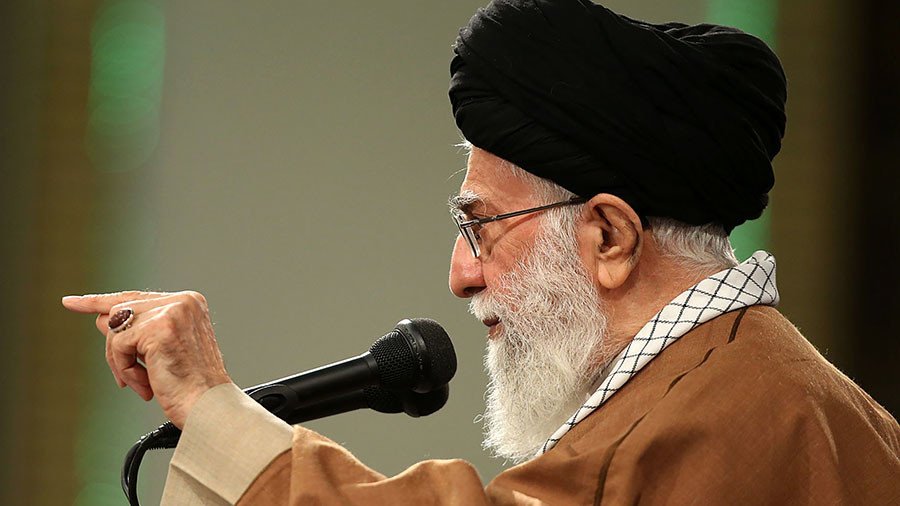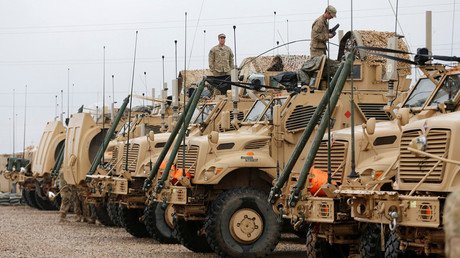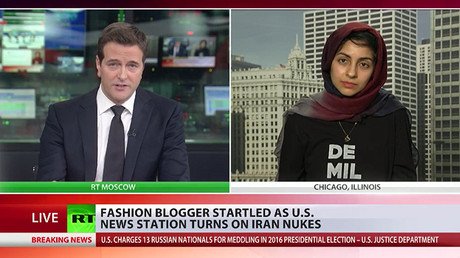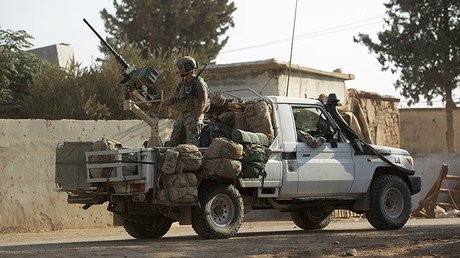‘We’ll talk when we step into America’: Iran’s regional affairs none of US business, Khamenei says

Tehran won’t seek permission from Washington to maintain its presence in the Middle East, Ayatollah Ali Khamenei has declared, adding that Tehran will talk with Americans if Iran decides to project power in their neighborhood.
The presence of the US military all across the globe and in the Middle East in particular is “malicious and seditious,” Iran’s supreme leader Khamenei said on his official website. Thus, Washington is no position to allow or disallow Tehran to increase its influence in the region, he emphasized, according to Reuters.
“We will negotiate with America when we want to be present in America,” the Iranian leader added.
The statement came as Khamenei was commenting on a recent visit to Iran of French Foreign Minister, Jean-Yves Le Drian, who reassured Tehran of Europe’s commitment to the 2015 nuclear deal. However, Le Drian also relayed European concerns over Iran’s missile program and its policies in the Middle East, which pretty-much echoed the US reservations about the Islamic Republic.
“European countries come [to Tehran] and say we want to negotiate with Iran over its presence in the region. It is none of your business. It is our region. Why are you here?” Khamenei wondered.
Last year, one of the top commanders of the Revolutionary Guard, Gen. Hossein Salami, said the range of Iranian ballistic missiles may be increased so that they could reach Europe if it sides with Israel and the US.
Donald Trump has threatened that Washington would withdraw from the 2015 Joint Comprehensive Plan of Action (JCPOA), signed between Tehran and six major world powers, calling it “the worst deal ever.” According to Trump, the accord should not only deal with Tehran’s nuclear ambitions, but also limit its missile program and activities in the Middle East, urging Europe to help achieve this.
Iran’s ballistic missile program has been rapidly developing in recent years, with the Soumar long-range missile reportedly being able to strike targets at a range of 3,000 kilometers. Tehran is also actively involved in regional affairs as it helped Syria in its fight against Islamic State (IS, formerly ISIS/ISIL) and other terror groups with weapons and manpower.
Iran’s missile production ‘increased three-fold’ – Revolutionary Guards commander https://t.co/vMKXVsLlXopic.twitter.com/0IhLfQ9TNk
— RT (@RT_com) March 7, 2018
It also aided some anti-terrorist efforts of the Iraqi authorities, with Defense Minister Amir Hatami also recently mulling over Iranian “military advisory and security” help to Afghanistan in order to tackle IS and Taliban. The West also blames the country for supporting Palestinian armed group Hamas, Lebanese Hezbollah and the Houthi rebels in Yemen. Tehran has been denying those accusations.
On Wednesday, Iranian President Hassan Rouhani pledged that “no one should be concerned about Iran’s weapons and missiles.” According to Rouhani, the country’s military might is only “meant to promote peace, strengthen stability and security and to prevent others from invading our country.”
Like this story? Share it with a friend!















